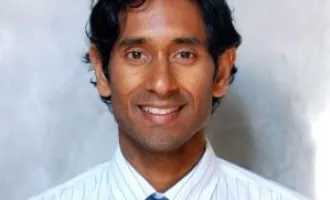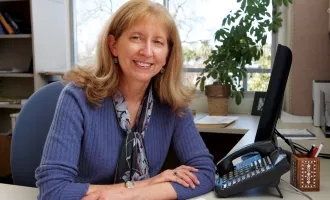Healing and Dealing with Disability
“If someone told my 7th grade self, who would regularly puke in the school bathroom between classes, that I would someday be a student at a health professional school, there’s absolutely no way I would have believed them.”
As a UCSF student who struggled with anorexia and anxiety disorder, “Taylor” (the student’s name has been changed for privacy) is one of many at UCSF who identify as having a disability.
But the various diseases and medical issues that we are taught to treat are often presented in ways that assume that we are exempt from experiencing those conditions ourselves.
Students are exposed to patients struggling with both mental and physical disability, and are taught to develop treatment plans, but are rarely taught what to do if struggling with these same issues.
To explore this gap in health education, I decided to speak with a student who was willing to share one perspective as someone with disabilities.
Q: Do you identify as someone with a disability?
A: I think before I can answer that, it’s really important to remember that in a discussion about what it means to have a disability, I can only speak for myself. The term “disability” encompasses a wide spectrum of both physical and mental conditions and people with disabilities have incredibly diverse experiences and backgrounds.
On one hand, I feel like it’s definitely problematic that we get lumped together into a collective group as “disabled people” but at the same time, I think there is definitely power to labeling, especially when it comes to increasing awareness and for enacting policy change.
But yes, to answer your question, I do identify as someone with disability. I struggled with anorexia in my pre-teen and early teenage years and was later diagnosed with generalized anxiety disorder.
Q: Did your experience with these medical issues impact your decision to pursue a career as a health professional?
A: You know it’s funny because early on I would say I was actually really deterred from anything healthcare related.
I’ve had some amazing therapists who completely changed my life course, but I always felt like being a healthcare professional and having mental health issues were mutually exclusive. Like, how could I help manage someone else’s health and serve as a support system for them if I had trouble managing my own?
It took me a really long time to get over that feeling.
Q: In that case, what prompted you to pursue a career as a health professional?
A: Well, I think it was really a matter of changing perspective.
When I went to college I got to meet other people with disabilities and got involved in community building. I started to feel like my experiences with mental health issues actually made me especially competent to be an advocate for patients.
I knew what it was like to have a medical provider that I didn’t really click with or who didn’t listen to me. I knew what it was like to be labeled as a difficult patient. But I also knew what it was like to have someone make me feel comfortable to be vulnerable and open up so that I would be receptive to treatment.
I think providers sometimes forget how scary it is to receive medical care but I feel that because I’ve been in these positions, I’m particularly receptive to addressing these issues in the patients that I will work with.
Q: Do you feel like there is stigma in healthcare when it comes to providers having a disability?
A: Of course. Actually, I think the stigma is worse within healthcare than it is in society in general.
Like I mentioned earlier, as we progress through school, it can feel like health professionals are not supposed to have certain problems.
We’re not supposed to have anxiety. Or depression. Or ADHD.
It can feel like even if we are struggling with these issues, we’re supposed to put on this front of confidence for our patients as if we’re immune to having our own health issues.
But honestly, I feel like being a good healthcare professional is about connecting with people. It’s inauthentic to pretend like we always have it all together. It makes us more human to acknowledge our health related issues and be transparent about how we manage those issues.
Q: What changes do you think need to be made in healthcare to create a more inclusive environment for people with disabilities?
A: I think it starts with educating colleagues and of course removing stigma.
I think lending support can be very tricky and I definitely understand that sometimes people don’t actually know how they can best help their peers.
But for me, what I want from peers more than anything is respect and the acknowledgement that I am just as capable as anyone else at being a competent health professional.
I’ve had plenty of conversations with friends who have ADHD and I think the same thing can be said about them having testing accommodations.
It’s important that people realize that needing testing accommodations does not mean that someone is incapable of acquiring the necessary knowledge to be a health professional. It means that the system that exists for testing knowledge does not accurately reflect the way in which someone with ADHD is able to express that knowledge.
Q: You’ve mentioned people with invisible disabilities and mental health issues. What about challenges faced by people with physical disabilities?
A: I think because this doesn’t directly relate to my own experiences, I don’t feel qualified or entitled to speak to the experiences of someone with a physical disability. But I will say that personally, I think that on an institutional level, accommodation needs to be a priority.
We’re conditioned to have a specific view of what a healthcare professional is supposed to look like, and I can guarantee you that most people would never envision a person with a physical disability if you asked them to consider what a medical professional looks like.
There may be specific fields within healthcare that require certain physical abilities, but I think what often ends up happening is that people with physical disabilities are altogether dissuaded from pursuing a career in healthcare because healthcare doesn’t have a reputation for being disability friendly.
That’s why I think it’s so important that we need to have more outreach to young people with disabilities and support on the administrative level to prove that people with disabilities can be just as successful in healthcare as their able-bodied counterparts.
UCSF students interested in working with patients with disability and addressing health care disparities that people with disabilities face can contact Disability & Health Interest Group at nikhil.rajapuram@ucsf.edu or andrew.lin@ucsf.edu. UCSF students who live with chronic pain, disability, or identify as allies can contact Disability Advocacy and Support (DAS) at Megan.Winkelman@ucsf.edu.


